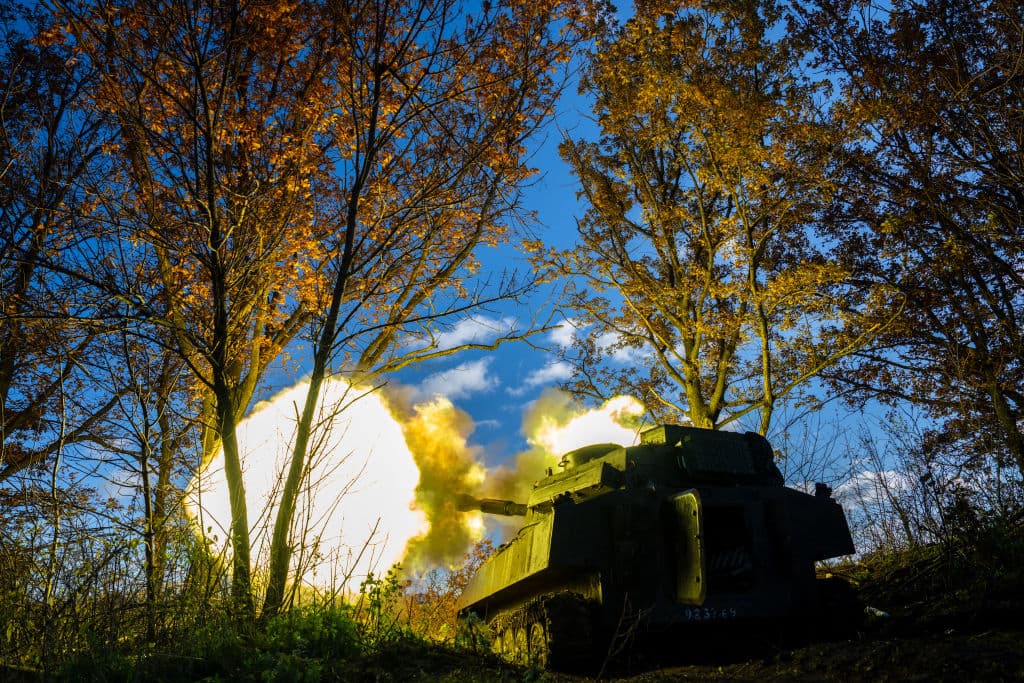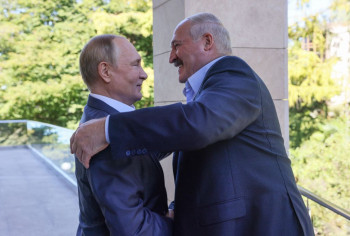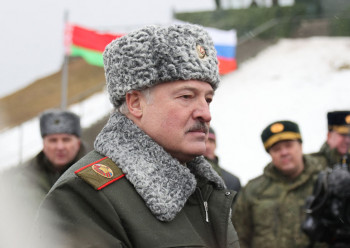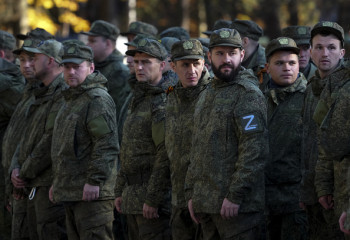Konrad Muzyka: ‘Russian military in Belarus within range of Ukrainian artillery systems’

The possibility of a renewed Russian invasion from Belarusian territory is once again in the news.
Belarusian dictator Alexander Lukashenko announced on Oct. 10 the creation of a joint regional military command with Moscow. The Belarusian Defense Ministry followed with a statement that 9,000 Russian troops would be stationed in the country.
Trains with Russian troops began arriving shortly after.
By mid-October, Russia had once again begun using Belarusian territory as a launchpad to fire rockets, missiles, and drones at Ukrainian cities.
The Kyiv Independent talked with Rochan Consulting Head Konrad Muzyka, a defense analyst focusing on Russia and Belarus, about a potential Russian offensive from Belarus, the capacity of Minsk to join the war directly, and whether Lukashenko’s regime depends on the outcome of Russia’s war against Ukraine.
The Kyiv Independent: Recently, there's been a lot of news coming from Lukashenko and his regime concerning the formation of the Joint Regional Command. The Belarus Defense Ministry said that they're going to welcome 9,000 Russian troops.
What does that mean for the war in Ukraine?
Konrad Muzyka: We do not know yet, to be honest.
We are waiting to see more data about what the Russians are up to exactly because there could be potentially several reasons as to what Russians are doing in Belarus.
The first and obvious one is training. Russian training ranges are overloaded with reservists. Some Russian reservists were actually sent to Belarus to train at their ranges. However, we also have to consider a scenario where Belarusians and Russians will train together, which could potentially indicate that Belarus may be taking a more active part in this war.
When it comes to these 9,000 Russian soldiers, it's obviously something that is not going to make a difference in this war. It's too few soldiers to send into Ukraine from Belarus.
The Kyiv Independent: How does it differ from what was happening in early February when Russian troops were moving into Belarus to be later sent to Ukraine?
Konrad Muzyka: The differences are massive.
In February, Russians deployed about 70% of their western command capability into Belarus – tanks, infantry, fighting vehicles, and combat aircraft. We are also looking at elements of the three airborne divisions deployed in Belarus.
Now, it's nothing of this kind. Not only is the number of reservists smaller, but they are also coming with no armored equipment. The images and videos that we saw published on social media and elsewhere showed only Russian reservists coming with trucks. And that's it, really.
There's no heavy equipment and no indication that they can get equipment from the Belarusian stocks.
The Kyiv Independent: Lukashenko also said that this new joint command would have around 70,000 soldiers in total. Could this number make a difference on the battlefield?
Konrad Muzyka: The Belarusian Armed Forces, in total, have about 45,000 men and women. Out of this number, about 18,000 could be potentially involved in maneuver operations.
We are looking at about 12,000 soldiers being deployed within the four mechanized brigades and two artillery regiments within the northwestern and northern Belarusian operational commands. We are also looking at about 6,000 men within the Special Forces Command there.
These are the guys who can actually go to Ukraine and fight.
The Kyiv Independent: Does the Belarus regime currently conduct mobilization to draw additional people?
Konrad Muzyka: So far, no, there is no mobilization in Belarus.
Belarus will have to significantly mobilize to get even 40,000-50,000 troops. The thing about the Belarusian Armed Forces is that they are a mobilization army. They are not ready to conduct combat operations right away.
They have equipment for another 15,000 to 18,000 soldiers, probably in storage.
They would need to mobilize significantly to reach the peacetime posture that they are supposed to have, which they don't have now. We have not seen a single piece of concrete evidence that would suggest that they are actually mobilizing right now.
They have conducted some mobilization exercises, like creating territorial defense battalions and companies. But there has not been any evidence to show that they are actually calling up reservists and sending them to standing brigades to inflate the number of personnel within these forces.
The Kyiv Independent: So if this joint military command looks like a smokescreen, then what's the purpose of these statements by the Belarusian regime?
Konrad Muzyka: There could actually be two reasons.
We have to remember that the Belarusian Armed Forces are essentially at the training ranges from April-May. Belarus has been training extensively. The tempo of their exercises has been the highest since the end of the Cold War.
They have actually practiced every single capability that they would need to then to utilize if they decided to go to war.
So, on the one hand, it could mean that Belarus is preparing for war. But on the other hand, it could mean that essentially the purpose of Belarusian military activity and the deployment of Russian forces into Belarus is to tie up Ukrainian military potential near the border with Belarus to ensure that these forces are not sent to Luhansk Oblast or Kherson.
It's too early to say which scenario will actually play out.
The Kyiv Independent: Belarusian Hajun reported that around 60 Belarusian tanks were shipped to Russia. What does it mean in terms of Belarusian and Russian military potential?
Konrad Muzyka: It probably means that Russia is lower on equipment. But it doesn't say much about Belarus’ military capability.
For Russia, Belarus is a storage hub. There are about 40 various levels of storage facilities in Belarus. They are Belarusian, but Russia actually maintains them. And Russia can legally take equipment from these storage facilities.
These storage facilities have everything that Russia would need to go to war.
The Kyiv Independent: What is the scale of what we're talking about?
Konrad Muzyka: We are talking about hundreds of tanks and hundreds of infantry fighting vehicles. So even if 60 or even 90 tanks were withdrawn from the storage facilities in Belarus and shipped to Russia, it will certainly not impact Belarusian military capability simply because there's an abundance of tanks and other equipment in Belarus in the storage.
The question is, what's the state of this equipment? And unfortunately, we do not know.
I believe that they are better maintained than in Russia simply because Belarus pays more attention to them. Belarus, as a state, I think, is more organized than Russia.
The Kyiv Independent: Back in March, when there were talks about Belarus' army joining the war, there were reports that many Belarusian soldiers or even officers didn't want to fight in Russia's war. They were even potentially going to sabotage Belarusian activity if sent to the front lines.
Is there any proof of that? Would they actively fight against Ukraine?
Konrad Muzyka: Let me say this – in 2020 when there were mass protests against Lukashenko, not a single Belarusian military officer actually changed sides. They all supported Lukashenko.
The Kyiv Independent: If Belarus joins the war, or if Russia ships enough people to Belarus to conduct a renewed offensive from the north, how critical will this be for Ukraine?
Konrad Muzyka: I don't think this will be a threat or that it will be a game changer for Ukraine, given the terrain that Belarusians and Russians will have to pass through. These areas are incredibly difficult to conduct any offensive operations.
There are a lot of rivers and lakes. The terrain is relatively muddy. Winter is coming, which will make the terrain even worse. There are relatively few roads, and it will be quite easy for Ukrainians to channel the Russian and Belarusian movement on these specific roads and then conduct artillery strikes against these forces.
Ukrainian artillery is now much better equipped and better trained in combat, obviously, much more experienced to conduct deep strike operations against Russians, and in this case, Belarusians.
So, definitely, the first few weeks are going to be difficult. But I don't think that 70,000 combatants are going to make a big difference in this war.
The Kyiv Independent: We know that hundreds of thousands of Belarusians protested in 2020. Lukashenko did crush the protests, yet his standing was seen as weak. Can we say that Belarus right now is occupied by Russia?
Konrad Muzyka: I would not necessarily say that Belarus is occupied by Russia. I would say that Russia is benefiting from all the weaknesses of the current Belarusian regime.
When the protests started in 2020, the West turned its back on Minsk, which I thought was the right thing to do. I wrote a post on my blog saying this was the end game because Belarus is now not going to have any leverage in its relationship with Russia.
It so desperately needs Russia's support that Lukashenko is going to go to great lengths to actually get this financial support from Putin.
I don't think Lukashenko has any other options other than Russia because to sustain his economy, he has to rely on financial support from Russia.
And we have to give it to him that given how much pressure he's been under by Putin to become more militarily involved in the war in Ukraine, he, nevertheless, has maintained relatively low engagement in this war. And if there are more Russian troops in Belarus, it's only because Lukashenko led to this situation.
The Kyiv Independent: Ukraine was very careful in communicating with the Belarusian opposition until February. Ukraine had perfect diplomatic ties with Lukashenko. Neither Zelensky nor Kuleba welcomed Sviatlana Tsikhanouskaya in Kyiv.
Was this the proper and necessary strategy? And what should be Ukraine's moves be now concerning the Belarusian regime and opposition?
Konrad Muzyka: I think Ukraine is concerned about potential attacks from Belarus. So I think that they didn't want to escalate the situation further since February. To be clear, the Russian military presence in Belarus, near the border with Ukraine, is within the range of Ukrainian artillery systems, for instance, HIMARS.
Russians have several battalions of S-400s, and they are within the range and could potentially be destroyed.
Nevertheless, Ukraine's political and military leadership still does not want to escalate the situation further, at least when it comes to military means.
The Kyiv Independent: Is it a fair assessment to say that the future of Belarus and of Lukashenko's regime depends on this war?
Konrad Muzyka: I've heard many voices saying that if Belarus deploys combat troops, then that's the end of Lukashenko. That's the end of his presidency, legacy, whatever it is.
But I'm not that convinced, I'll be honest.
The Belarusian security apparatus appears to be so effective and, at the same time, so ruthless that it could be, that even if Belarus becomes militarily involved in this war, the security forces can actually crush down on any resentment or on any protest activity of Belarusians.
The change in Belarus actually has to come from within. And it's the same in Russia. The regime would need to collapse from the inside. Instigated by the military, security forces, and oligarchs. It's up to them.
Looking at how the 2020 protests played out, I don't think that ordinary civilians in the streets will topple Lukashenko.
The Kyiv Independent: What should we expect from Belarus in the near future?
Konrad Muzyka: Belarus will continue to allow Russia to use its territory to conduct strikes against Ukraine. It will continue to provide logistical support for these forces. It will continue to supply weapons to Russian forces fighting elsewhere, like in Donbas.
But whether they will actually increase the number of their forces near the border, we don't know. But we have to observe the situation very carefully.












